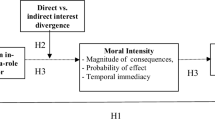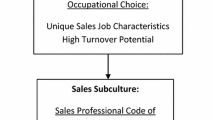Abstract
Most large companies and many smaller ones have adopted ethics codes, but the evidence is mixed as to whether they have a positive impact on the behavior of employees. We suggest that one way that ethics codes could contribute to ethical behavior is by influencing the perceptions that employees have about the ethical values of organizations. We examine whether a group of sales professionals in organizations with ethics codes perceive that their organizational context is more supportive of ethical behavior than sales professionals in companies without codes. After accounting for the effect of several covariates, our results indicated that sales professionals employed in organizations with codes of ethics perceived their work environments to have more positive ethical values than did other sales professionals.
Similar content being viewed by others
References
Adams, J. S., A. Tashchian and T. Shore: 2001, ‘Codes of Ethics as Signals for Ethical Behavior’, Journal of Business Ethics 29, 199-211.
Armstrong, J. S. and T. S. Overton: 1977, ‘Estimating Nonresponse Bias in Mail Surveys’, Journal of Marketing Research 14, 396-402.
Ballard, R.: 1992, ‘Short Forms of the Marlowe-Crowne Social Desirability Scale’, Psychological Reports 71, 1155-1160.
Barnett, T. and C. Vaicys: 2000, ‘The Moderating Effect of Individuals' Perceptions of Ethical Work Climate on Ethical Judgments and Behavioral Intentions’, Journal of Business Ethics 27, 351-362.
Cassell, C., P. Johnson and K. Smith: 1997, ‘Opening the Black Box: Corporate Codes of Ethics in their Organizational Context’, Journal of Business Ethics 16, 1077-1093.
Crowne, D. P. and D. Marlowe: 1960, ‘A New Scale of Social Desirability Independent of Psychopathology’, Journal of Consulting Psychology 24, 349-354.
Dawson, L. M.: 1997, ‘Ethical Differences Between Men and Women in the Sales Profession’, Journal of Business Ethics 16, 1143-1152.
DeConinck, J. B and W. F. Lewis: 1997, ‘The Influence of Deontological and Teleological Considerations and Ethical Climate on Sales Managers' Intentions to Reward or Punish Sales Force Behavior’, Journal of Business Ethics 16, 497-506.
Farrell, H. and B. Farrell: 1998, ‘The Language of Business Codes of Ethics. Implications of Knowledge and Power’, Journal of Business Ethics 17, 587-601.
Ferrell, O. C., and J. Fraedrich: 1991, Business Ethics: Ethical Decision Making and Case(Houghton Mifflin Company, Boston), p. 60.
Fischer, D. G. and C. Fick: 1993, ‘Measuring Social Desirability: Short Forms of the Marlowe-Crowne Social Desirability Scale’, Educational and Psychological Measurement 53, 417-424.
Fritz, J. M. H., R. C. Arnett and M. Conkel: 1999, ‘Organizational Ethical Standards and Organizational Commitment’, Journal of Business Ethics 20, 289-299.
Hunt, S. D. and S. Vitell: 1986, ‘A General Theory of Marketing Ethics’, Journal of Macromarketing 8, 5-16.
Hunt, S. D., V. Wood and L. Chonko: 1989, ‘Corporate Ethical Values and Organizational Commitment in Marketing’, Journal of Marketing 53, 79-90.
McCabe, D. L., L. K. Trevino, and K. D. Butterfield: 1996, ‘The Influence of Collegiate and Corporate Codes of Conduct on Ethics-Related Behavior in the Workplace’, Business Ethics Quarterly 6, 461-476.
McClaren, N.: 2000, ‘Ethics in Personal Selling and Sales Management: A Review of the Literature Focusing on Empirical Findings and Conceptual Foundations’, Journal of Business Ethics 27, 285-303.
Mowday, R. T., R. M. Steers and L. W. Porter: 1979, ‘The Measurement of Organizational Commitment’, Journal of Vocational Behavior 14, 224-247.
Paulhus, D. L.: 1984, ‘Two-component Models of Socially Desirable Responding’, Journal of Personality and Social Psychology 46, 598-609.
Randall, D. M. and M. Fernandes: 1991, ‘The Social Desirability Response Bias in Ethics Research’, Journal of Business Ethics 10, 805-817.
Rich, G. A.: 1997, ‘The Sales Manager as a Role Model: Effects on Trust, Job Satisfaction, and Performance of Salespeople’, Journal of the Academy of Marketing Science 25, 319-328.
Schwartz, M.: 2001, ‘The Nature of the Relationship Between Corporate Codes of Ethics and Behavior’, Journal of Business Ethics 32, 247-262.
Sims, R. R.: 1991, ‘The Institutionalization of Organizational Ethics’, Journal of Business Ethics 10, 493-506.
Singhapakdi, A.: 1999, ‘Perceived Importance of Ethics and Ethical Decision Making in Marketing’, Journal of Business Research 45, 89-99.
Strahan, R. and K. C. Gerbasi: 1972, ‘Short, Homogeneous Versions of the Marlowe-Crowne Social Desirability Scale’, Journal of Clinical Psychology 28, 191-193.
Trevino, K. T.: 1986, ‘Ethical Decision Making in Organizations: A Person-Situation Interaction Model’, Academy of Management Review 11(3), 601-617.
Trevino, L. K., K. Butterfield and D. McCabe: 1998, ‘The Ethical Context in Organizations: Influences on Employee Attitudes and Behaviors’, Business Ethics Quarterly 8, 447-476.
Tucker, L. R., V. Stathakopolous and C. Patti: 1999, ‘A Multidimensional Assessment of Ethical Codes: The Professional Business Association Perspective’, Journal of Business Ethics 19, 287-300.
Victor, B. and J. Cullen: 1988, ‘The Organizational Bases of Ethical Work Climates’, Administrative Science Quarterly 33, 101-125.
Weaver, G. R., L. K. Trevino and P. L. Cochran: 1999, ‘Corporate Ethics Practices in the Mid-1990's: An Empirical Study of the Fortune 1000’, Journal of Business Ethics 18, 283-294.
Wotruba, T. R.: 1990, ‘A Comprehensive Framework for the Analysis of Ethical Behavior, with a Focus on Sales Organizations’, Journal of Personal Selling and Sales Management 10, 29-42.
Wotruba, T. R., L. B. Chonko and T. W. Low: 2001, ‘The Impact of Ethics Code Familiarity on Manager Behavior’, Journal of Business Ethics 33, 59-69.
Zerbe, W. J. and D. Paulhus: 1987, ‘Socially Desirable Responding in Organizational Behavior: A reconception’, Academy of Management Review 12, 250-264.
Rights and permissions
About this article
Cite this article
Valentine, S., Barnett, T. Ethics Codes and Sales Professionals' Perceptions of Their Organizations' Ethical Values. Journal of Business Ethics 40, 191–200 (2002). https://doi.org/10.1023/A:1020574217618
Issue Date:
DOI: https://doi.org/10.1023/A:1020574217618




